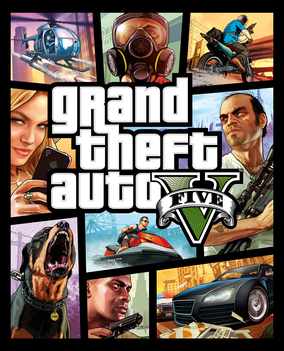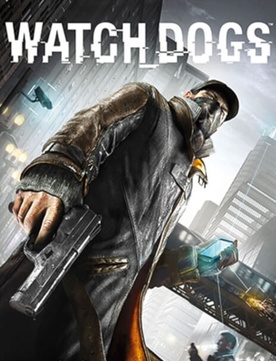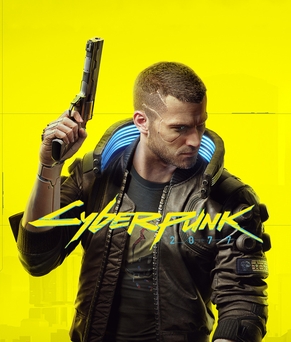
Neuromancer is an adventure video game developed by Interplay Productions and published by Mediagenic. It was released in 1988 for the Amiga, Apple II, Apple IIGS, Commodore 64, and MS-DOS. It was loosely based on William Gibson's 1984 novel of the same name and set within both the fictional "real world" and the extensively realized and detailed world of cyberspace. It has a soundtrack based on the Devo song "Some Things Never Change" from their album Total Devo. Writer Timothy Leary had sub-contracted the rights to a video game adaptation of the novel, and eventually brought the project to Interplay to develop.

Doom is a 2016 first-person shooter game developed by id Software and published by Bethesda Softworks. The game is the first major installment in the Doom series since 2004's Doom 3. It was released for PlayStation 4, Windows, and Xbox One in May 2016. A port for Nintendo Switch was co-developed with Panic Button and released in November 2017, and a version for Google Stadia was released in August 2020.

Grand Theft Auto V is a 2013 action-adventure game developed by Rockstar North and published by Rockstar Games. It is the seventh main entry in the Grand Theft Auto series, following 2008's Grand Theft Auto IV, and the fifteenth instalment overall. Set within the fictional state of San Andreas, based on Southern California, the single-player story follows three protagonists—retired bank robber Michael De Santa, street gangster Franklin Clinton, and drug dealer and gunrunner Trevor Philips—and their attempts to commit heists while under pressure from a corrupt government agency and powerful criminals. The open world design lets players freely roam San Andreas's open countryside and the fictional city of Los Santos, based on Los Angeles.

Flotilla is a 2010 turn-based strategy space combat video game developed by Brendon Chung's studio, Blendo Games. The game was released in March 2010 on Steam for Microsoft Windows and on Xbox Live Indie Games for the Xbox 360. Flotilla was designed with Microsoft's XNA tools, and its development was influenced by animals as well as board games such as Axis and Allies and Arkham Horror. The game takes the player in an adventure through a randomly generated galaxy.
Blendo Games is an American independent video game development company based in Culver City, California. It was founded by Brendon Chung in 2010 and is primarily a one-person effort. Blendo Games gained more widespread exposure with the short form stand alone title Gravity Bone; the following games Flotilla and Atom Zombie Smasher were met with critical praise. The studio has also released several other games in several genres.

Gravity Bone is a 2008 freeware adventure game developed and published by Blendo Games. The game employs a modified version of id Software's id Tech 2 engine—originally used for Quake 2—and incorporates music from films by director Wong Kar-wai, which were originally performed by Xavier Cugat. Four incarnations of the game were produced during its one-year development; the first featured more common first-person shooter elements than the released version. Subsequent versions shifted in a new direction, with the inclusion of more spy-oriented gameplay. The game was released for Microsoft Windows in August 2008.

Watch Dogs is a 2014 action-adventure game developed by Ubisoft Montreal and published by Ubisoft. It is the first installment in the Watch Dogs series. The game is played from a third-person perspective, and its world is navigated on foot or by vehicle. Set within a fictionalized version of the Chicago area in 2013, the single-player story follows grey hat hacker and vigilante Aiden Pearce's quest for revenge after the killing of his niece. An online multiplayer mode allows up to eight players to engage in cooperative and competitive gameplay.

Cyberpunk 2077 is a 2020 action role-playing video game developed by CD Projekt Red and published by CD Projekt, based on video game designer Mike Pondsmith's game series. Set in a dystopian cyberpunk universe, the player assumes the role of "V", a mercenary in the fictional Californian city known as "Night City", where they deal with the fallout from a heist gone wrong that results in an experimental cybernetic "bio-chip" containing an engram of the legendary rock star and terrorist Johnny Silverhand threatening to slowly overwrite V's mind; as the story progresses V and Johnny must work together to find a way to be separated and save V's life.

CD Projekt S.A. is a Polish video game developer, publisher and distributor based in Warsaw, founded in May 1994 by Marcin Iwiński and Michał Kiciński. Iwiński and Kiciński were video game retailers before they founded the company, which initially acted as a distributor of foreign video games for the domestic market. The department responsible for developing original games, CD Projekt Red, best known for The Witcher series, was formed in 2002. In 2008, CD Projekt launched the digital distribution service Good Old Games, now known as GOG.com.

Thirty Flights of Loving is a first-person adventure video game developed by Brendon Chung under the name Blendo Games. It was published in August 2012 for Microsoft Windows, in November 2012 for OS X, and in December 2021 for Linux. The game is a non-direct sequel to Gravity Bone (2008) with the same unnamed spy as the main character. It follows three people as they prepare for an alcohol heist and the aftermath of the operation.

Hyper Light Drifter is a 2D action role-playing game developed by Heart Machine. The game pays homage to 8-bit and 16-bit games, and is considered by its lead developer Alx Preston as a combination of The Legend of Zelda: A Link to the Past and Diablo. Preston originally launched Kickstarter funding for the title for approximately US$27,000 to develop the title for Microsoft Windows, OS X, and Linux computers, but ended up with more than US$600,000, allowing him to hire more programmers and artists, and expanding the title for console and portable platforms through stretch goals. Though originally scoped for release in 2014, various improvements in the game and issues with Preston's health set the release back. The Microsoft Windows, Linux and OS X versions were released in March 2016, and the PlayStation 4 and Xbox One versions in July 2016. A Special Edition port of the game, featuring additional content, was released by Abylight Studios for the Nintendo Switch in September 2018 and for iOS devices in July 2019.

Jazzpunk is an adventure video game developed by Necrophone Games and published by Adult Swim Games. The game was released for Microsoft Windows, OS X and Linux in February 2014. A director's cut of the game, self-published by Necrophone Games, was released for the PlayStation 4 in September 2016, and for personal computer platforms in June 2017.

Grand Theft Auto Online is an online multiplayer action-adventure game developed by Rockstar North and published by Rockstar Games. It was released on 1 October 2013 for PlayStation 3 and Xbox 360, 18 November 2014 for PlayStation 4 and Xbox One, 14 April 2015 for Windows, and 15 March 2022 for PlayStation 5 and Xbox Series X/S. The game is the online component of Grand Theft Auto V. Set within the fictional state of San Andreas, Grand Theft Auto Online allows up to 30 players to explore its open world environment and engage in cooperative or competitive game matches.

Stardew Valley is a farm life simulation game developed by Eric "ConcernedApe" Barone. Players take the role of a character who inherits their deceased grandfather's dilapidated farm in a place known as Stardew Valley. The game was released for Windows in February 2016 before being ported to other platforms. Stardew Valley is open-ended, allowing players to grow crops, raise livestock, fish, cook, mine, forage, and socialize with the townspeople, including the ability to marry and have children. It allows up to four players to play online together.

Observer is a psychological horror video game developed by Bloober Team and published by Aspyr. It was released for Microsoft Windows, PlayStation 4 and Xbox One in August 2017, followed by versions for Linux, macOS and Nintendo Switch. An upgraded and expanded version called Observer: System Redux was released in November 2020 for Windows, PlayStation 5, and Xbox Series X/S, for Amazon Luna in March 2021, and for PlayStation 4 and Xbox One in July 2021. Observer follows Daniel Lazarski, a detective known as an Observer, who can hack people's minds as a method of interrogation.

Monaco: What's Yours Is Mine is a 2013 stealth video game developed by Pocketwatch Games in which players, alone or cooperatively, perform heists and robberies. Players choose from eight characters, each of whom has a unique and beneficial skill, such as the ability to change appearance or tunnel through walls. Monaco's single-player story is told in four acts from perspectives of different characters. The cooperative mode lets up to four players play together in different locations.

Star Trek: Bridge Crew is a virtual-reality action-adventure video game developed by Red Storm Entertainment and published by Ubisoft for Microsoft Windows, PlayStation 4, and Oculus Quest.

Robo Recall is a virtual reality first-person shooter game developed and published by Epic Games for Oculus Rift and Oculus Quest platforms. The game was released for the Oculus Rift on March 1, 2017, and an Oculus Quest version titled Robo Recall: Unplugged was released on May 21, 2019. Players that activate their Oculus Touch virtual reality controllers with its software are able to download the game for free.

The Foo Show was an interactive virtual reality talk show developed by Foo VR and created by Will Smith. The first episode was released in April 2016.

The Ascent is a cyberpunk-themed action role-playing video game developed by Swedish indie game studio Neon Giant and published by Curve Digital for Microsoft Windows, Xbox Series X/S and Xbox One on 29 July 2021. It was developed using Unreal Engine 4 by a team of 12 people and is Neon Giant's debut in the industry. The game received positive reviews from critics upon its release, with praise for its visuals, combat, and soundtrack, but criticism for the emphasis on grinding.




















